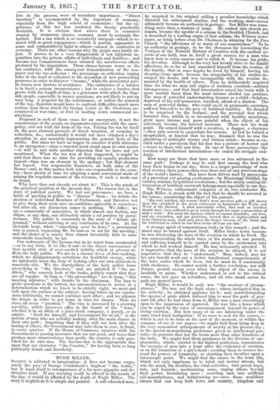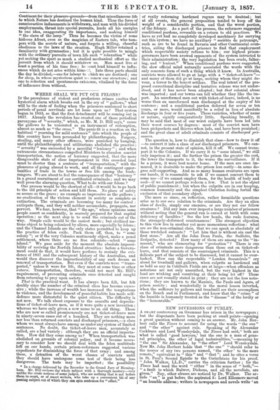HUGH MILLER.
SOCEETY is addicted to intoxication : it does not become corporately the prey of George Cruikshank's bugbear "the bottle," but it lends itself to intemperance of a far more gigantic and destructive kind. If any warning could be offered to the mania of the day, it would be afforded by the death of Hugh Miller. The story is as plain as it is simple and painful. I self-educated man, he acquired in his original calling a peculiar knowledge which directed his subsequent studies, and the working-stone-mason ultimately became an authority. in geolopy. But Miller vras something more than a student of stone. He rushed into church polemics, became the apostle of a schism in the Scottish Church, anil is described by a leading organ of that schism, the Witness newspaper, as being before even Dr. Chalmers in winning for the Free Churl "the affections of so many of our countrymen." To be an authority in geology, to be the champion. for reconciling the Vestiges of the Natural History of Creation with the earliest records of our faith, was in itself a great success for a man whoknew how to value success and to relish it. It became his pride, his devotion. Although to the very last keenly alive to the family affections, he so far at last separated himself from the routine of the family, that in some degree he lived by himself, having his sleeping-room apart, because the irregularity of his studies deranged his hours, and was incompatible with the routine demanded by the health of others. Thus he deliberately acquired time for what we may call orgies of studious exertion—solitary intemperance ; and that fatal intoxication seized his brain with a more morbid furor than the most intense alcohol can produce. The man of powerful understanding became as a child—helpless, deprived of his self-possession, terrified, afraid of a shadow. The man of powerful frame, who could excel in gymnastic exercises, suffered himself to be the prey of habitual timidity. He dreaded to be surprised by the footpad ; and the personal fear which haunted him, which is so inconsistent with healthy manliness, grew more intense and more painful when the object of his solicitude became his beloved museum. There was his weak point. He armed himself with a revolver, a dagger, a claymore —they only served to exacerbate his terrors. At last he turned a sleepwalker, or fancied that he was ; dreamed that he was the plaything of midnight storms and furious winds ; became so excited under a paroxysm that his face was a picture of horror and a terror to those who saw him. In one of those paroxysms—the reaction of intellectual intoxication—he ended the struggle suddenly. How many are there that have more or less advanced in the same path ! Perhaps it may be said that among the host who busy their brains in our day, there is a larger percentage of men that overtax their powers than ever there was at any previous stage of the world's history. Men have been driven mad by paroxysms of a prevalent yet passing excitement—by Mississippi bubbles, by railway, manias, by political revolutions ; but the steady soaking intoxication of habitual overwork belongs most especially to our day.
The Witness, enthusiastic eulogizer of its late conductor Mr. Hugh Miller, is struck with the fact that he should be arrested in. his course, considering the object of his pursuit.
"His very intellect, his reason—God's most precious gift—a gift dearer than life—perished in the great endeavour to harmonize the Works and Word of the Eternal. A most inscrutable event, that such an intellect should have been suffered to go to wreck through too eager a prosecution of such a work ! But amid the mystery which we cannot penetrate, our love, and our veneration, and our gratitude, toward that so highly-gifted and truly Christian man, shall only grow tie deeper because of the cloud and the whirlwind in which he has been borne off from our side."
A strange spirit of remonstrance lurks in this remark ; and the moral may be turned against itself. Miller broke down because he was disobeying the laws of the creation in which he lived. He was concentrating the whole force of his nature in one pursuit, and suffering himself to be carried away by the excitement into which he had worked himself. He was necessarily arrested. It
is imperative that the laws of the creation be obeyed, it is not imperative that they, be "understood." . Man, indeed, may for his own benefit work out a better intellectual comprehension of the laws under which he lives, but he must do it consistently with obedience. He cannot snatch a further revelation, nor will Nature permit excess even when the object of the excess is laudable or pious. Whether understood or not in the critical sense, the law goes on relentless, and all who stand across its path are mowed down. Hugh Miller, it would be said, was "the creature of circumstances." His was not the fault alone ; others instigated him in his activity ; he obtained applause for it ; and, notwithstanding the species of pride which induced him to wear the garb of peasant life after he had risen from it, Miller was a man exceedingly open to tile impression of approval. He was like a horse which can be urged by the voice of encouragement beyond its power of living exertion. But how many of us are labouring under the same cruel-kind instigation ! If we were to seek for the causes,— which is not to be done on the spur of the moment, or within the compass of one of our pages,—we might find them lying deep in the very economical arrangements of society at the present day ; in the special monopolizing preference given to intellectual pursuits—to pursuits that tax the brain more than other functions of the body. We might find them perchance in the division of employments, which, carried to the highest perfection, concentrates the energies of men into a hunt after the evidences of creation, or on the formation of a pin's-head ; exciting them to courses beyond the powers of humanity, or stunting their faculties upon a microscopic point. We might find the causes in the town life, which not only imprisons us to brick and mortar streets, but sets the mind, the faculties the vital activities, into roved ways, ruts, and kennels; mechanizing some urging others beyond their power, brutalizing more ; assorting men into artificial self-manufactures, and withdrawing us—save those wealthier classes that can keep both town and country, kingdom and Continent for their pleasure-grounds—from that miscellaneous life . to which Nature has destined the human kind. Thus the force of counteractive inducements is withdrawn, and man with his divided employments, thrust into special pursuits, lends all his energies to one idea, exaggerating its importance, and making himself "the slave of the lamp." Thus he becomes the victim of some hideous .cifreet, even as the magician of Eastern tale, who tampers with the secrets of nature, and forgets a willing, cheerful obedience to the laws of the creation. Hugh Miller retained a familiarity with gymnastics; but it is quite possible to mingle with the ordinary pursuits of town life such " relaxation " while yet making the sport as much a studied mechanical effort as the pursuit from which it should withdraw us. Man must live at least a portion of his time free ; he -.must lend himself to influences which do not arise within hims,l f. Into three parts should the day be divided,—one for labour to which we are destined ; one for sleep, in whose mysterious quiet we renew our structure ; and one to refection and spontaneous existence, vitalized by the force of influences from without.

































 Previous page
Previous page